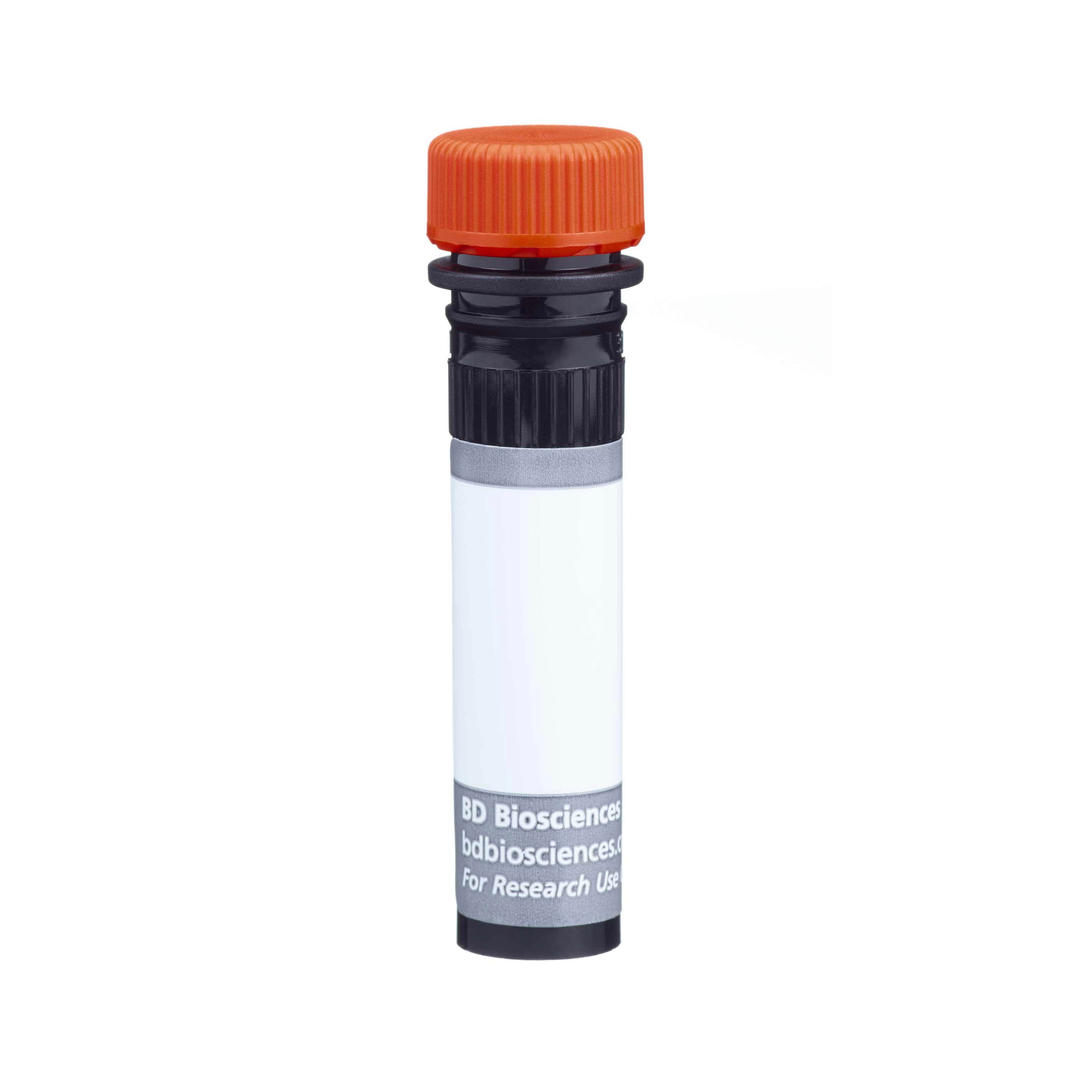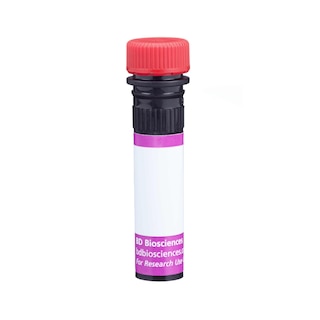Old Browser
Looks like you're visiting us from United States.
Would you like to stay on the current country site or be switched to your country?
BD OptiBuild™ BUV737 Mouse Anti-Mouse Vβ 8.1, 8.2 TCR
克隆 MR5-2 (RUO)


监管状态图例
未经BD明确书面授权,严禁使用未经许可的任何商品。
准备和存储
推荐的实验流程
For optimal and reproducible results, BD Horizon Brilliant Stain Buffer should be used anytime two or more BD Horizon Brilliant dyes (including BD OptiBuild Brilliant reagents) are used in the same experiment. Fluorescent dye interactions may cause staining artifacts which may affect data interpretation. The BD Horizon Brilliant Stain Buffer was designed to minimize these interactions. More information can be found in the Technical Data Sheet of the BD Horizon Brilliant Stain Buffer (Cat. No. 563794).
商品通知
- This antibody was developed for use in flow cytometry.
- The production process underwent stringent testing and validation to assure that it generates a high-quality conjugate with consistent performance and specific binding activity. However, verification testing has not been performed on all conjugate lots.
- Researchers should determine the optimal concentration of this reagent for their individual applications.
- An isotype control should be used at the same concentration as the antibody of interest.
- Caution: Sodium azide yields highly toxic hydrazoic acid under acidic conditions. Dilute azide compounds in running water before discarding to avoid accumulation of potentially explosive deposits in plumbing.
- For fluorochrome spectra and suitable instrument settings, please refer to our Multicolor Flow Cytometry web page at www.bdbiosciences.com/colors.
- Please refer to www.bdbiosciences.com/us/s/resources for technical protocols.
- BD Horizon Brilliant Stain Buffer is covered by one or more of the following US patents: 8,110,673; 8,158,444; 8,575,303; 8,354,239.
- BD Horizon Brilliant Ultraviolet 737 is covered by one or more of the following US patents: 8,110,673; 8,158,444; 8,227,187; 8,575,303; 8,354,239.
数据表
配套商品






最近查看的内容
The MR5-2 antibody reacts with the Vβ 8.1 and Vβ 8.2 T-cell Receptors (TCR), but not the Vβ 8.3 TCR, of mice having the b haplotype (e.g., A, AKR, BALB/c, CBA/Ca, CBA/J, C3H/He, C57BL, C58, DBA/1, DBA/2) of the Tcrb gene complex. The Tcrb-V8 subfamily gene loci are deleted in mice having the a (e.g., C57BR, C57L, SJL, SWR) or c (e.g., RIII) haplotype. Vβ 8.1 TCR-bearing T lymphocytes are clonally eliminated in mice expressing superantigen encoded by the Mtv-7 (Mls-1a, Mlsa), provirus (e.g., AKR, CBA/J, C58, DBA/2), and activation or elimination of Vβ 8.1 TCR-expressing T cells by this determinant is partially dependent upon presentation by I-E. Mtv-43 (e.g., MA/MyJ), Mtv-44 (e.g., NZW), and/or exogenous MMTV-SW superantigens also cause incomplete elimination of Vβ 8.1 TCR-bearing T cells. In addition to expression on conventional T lymphocytes, Vβ 8.2 is the predominant β chain of the TCR on NK-T cells. Staphylococcal enterotoxin B, in association with antigen presenting cells expressing I-A and/or I-E, stimulates lymphocytes bearing Vβ 8 TCR and selectively eliminates those T cells in vivo. Plate-bound MR5-2 antibody activates Vβ 8.1 or 8.2 TCR-bearing T lymphocytes.
The antibody was conjugated to BD Horizon™ BUV737 which is part of the BD Horizon Brilliant™ Ultraviolet family of dyes. This dye is a tandem fluorochrome of BD Horizon BUV395 with an Ex Max of 348-nm and an acceptor dye with an Em Max at 737-nm. BD Horizon Brilliant BUV737 can be excited by the ultraviolet laser (355 nm) and detected with a 740/35 filter. Due to the excitation of the acceptor dye by other laser lines, there may be significant spillover into channels detecting Alexa Fluor® 700-like dyes (eg, 712/20-nm filter).
Due to spectral differences between labeled cells and beads, using BD™ CompBeads can result in incorrect spillover values when used with BD Horizon BUV737 reagents. Therefore, the use of BD CompBeads or BD CompBeads Plus to determine spillover values for these reagents is not recommended. Different BUV737 reagents (eg, CD4 vs. CD45) can have slightly different fluorescence spillover therefore, it may also be necessary to use clone specific compensation controls when using these reagents.

研发参考 (11)
-
Behlke MA, Chou HS, Huppi K, Loh DY. Murine T-cell receptor mutants with deletions of beta-chain variable region genes. Proc Natl Acad Sci U S A. 1986; 83(3):767-771. (Biology). 查看参考
-
Bendelac A. Mouse NK1+ T cells. Curr Opin Immunol. 1995; 7(3):367-374. (Biology). 查看参考
-
Fairchild S, Rosenwasser OA, Dyson PJ, Tomonari K. Tcrb-V3+ T-cell deletion and a new mouse mammary tumor provirus, Mtv-44. Immunogenetics. 1992; 36(3):189-194. (Biology). 查看参考
-
Haqqi TM, Banerjee S, Anderson GD, David CS. RIII S/J (H-2r). An inbred mouse strain with a massive deletion of T cell receptor V beta genes. J Exp Med. 1989; 169(6):1903-1909. (Biology). 查看参考
-
Hodes RJ, Abe R. Mouse endogenous superantigens: Ms and Mls-like determinants encoded by mouse retroviruses.. Curr Protoc Immunol. 2001; Appendix 1:Appendix 1F. (Biology). 查看参考
-
Hugo P, Kappler JW, Godfrey DI, Marrack PC. Thymic epithelial cell lines that mediate positive selection can also induce thymocyte clonal deletion. J Immunol. 1994; 52(3):1022-1031. (Biology). 查看参考
-
Kanagawa O. Antibody-mediated activation of T cell clones as a method for screening hybridomas producing antibodies to the T cell receptor. J Immunol Methods. 1988; 110(2):169-178. (Immunogen). 查看参考
-
Kruisbeek AM, Shevach EM. Proliferative assays for T cell function. Curr Protoc Immunol. 2004; 3:3.12.1-3.12.14. (Biology). 查看参考
-
Shinohara K, Ikarashi Y, Maruoka H, et al. Functional and phenotypical characteristics of hepatic NK-like T cells in NK1.1-positive and -negative mouse strains. Eur J Immunol. 1999; 29(6):1871-1878. (Biology). 查看参考
-
Tomonari K, Fairchild S. Positive and negative selection of Tcrb-V6+ T cells. Immunogenetics. 1992; 36(4):230-237. (Biology). 查看参考
-
White J, Herman A, Pullen AM, Kubo R, Kappler JW, Marrack P. The V beta-specific superantigen staphylococcal enterotoxin B: stimulation of mature T cells and clonal deletion in neonatal mice. Cell. 1989; 56(1):27-35. (Biology). 查看参考
Please refer to Support Documents for Quality Certificates
Global - Refer to manufacturer's instructions for use and related User Manuals and Technical data sheets before using this products as described
Comparisons, where applicable, are made against older BD Technology, manual methods or are general performance claims. Comparisons are not made against non-BD technologies, unless otherwise noted.
For Research Use Only. Not for use in diagnostic or therapeutic procedures.
